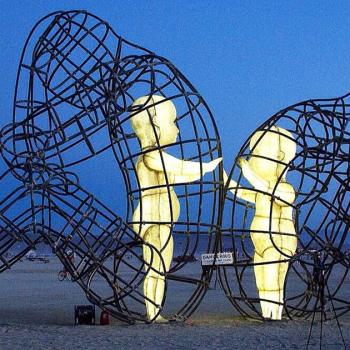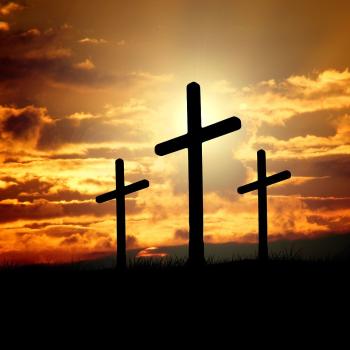
I generally avoid this topic, especially since the SCOTUS leak about the overturning of Roe v. Wade – the key legal judgement underpinning the right to abortions in the United States. So why write about it now?
Truthfully, I don’t want to. It’s a topic that causes such division, including among believers, but that is exactly why I feel I must at least attempt to foster some understanding. I’m hoping that some of the fever heat has died down, and the issue can be discussed sensibly and with nuance. My intention here is to unite, rather than divide, though Patheos commenters cannot always be relied upon to take the same approach – fair warning, any nastiness, name-calling, or judgement will not be approved. Here goes…
What does the Bible say about abortion?
The simple answer is nothing direct, though certain passages might carry implications. Most commonly, pro-life (anti-abortion) Christians quote Psalm 139 to justify their position. Verses 13-14:
‘…for it was You who created my inward parts; you knit me together in my mother’s womb. I will praise You because I have been fearfully and wonderfully made.’
Taken literally, this verse would have to mean that the process of knitting a person together is a direct, divine act, fully under his control. Alternatively, this could be read as the psalmist’s attempt to express gratitude for his existence, and his acknowledgement of God as the Author of Life. For me, the second explanation makes more sense. There are children who cannot survive the birthing process, and others who only live for a few moments outside the womb. If God is in control in the way many assert, every tragedy of pregnancy and birth would be his to account for. I would not worship that God.
In the same sense, people might refer to a sunset as painted by God’s hand, a masterwork of the Divine Artist, when what they’re really sharing is their appreciation of the natural beauty we witness each and every day. Hebrews 3, verse 1 includes the assertion that Jesus ‘sustains all things by his powerful word’, which for me describes the way in which God creates. He has established the laws of physics, cause and effect, the ability to procreate, the planets and their interaction, and after the fact of bringing all things into existence, also sustains those processes and systems. Rather than paint each sunset, God has created the natural processes which result in a million expressions of the same beautiful, daily experience.
That is also how I understand the psalmist’s words about being knit together in my mother’s womb. God was aware of ‘me’ in the womb (he is omniscient), loved me (he is Love), and dreamed big for my life (as he does for all people), but I don’t think it is sensible to interpret a poet’s lyrics as a scientific description of a biological/spiritual process.
Contrary to popular belief, the Bible actually presents significant problems to those who want to use the scriptures as a basis for an anti-abortion stance. In Numbers 5, a process is described in which a woman suspected of infidelity is tested to determine her innocence or lack of it. She is given a vessel full of ‘bitter water that brings a curse’, which she then drinks. If she is unharmed, she is considered innocent, but if she has been unfaithful to her husband, the result of the bitter, cursed water is essentially an abortion (v. 21-22):
‘…may the Lord cause you to become a curse among your people when he makes your womb miscarry and your abdomen swell. May this water that brings a curse enter your body so that your abdomen swells or your womb miscarries.
Some insist there must be something in the concoction to make a pregnant woman miscarry, the assumption being that the child is not her husband’s, while others believe that it is the curse itself which causes the pregnancy to fail. Either way, this is a religiously prescribed termination of a pregnancy.
There are plenty of passages in the Old Testament that are upsetting to most modern eyes and sensibilities, and I am far from comfortable with this one, but I quote it to show that the Bible’s approach to the status of life in the womb is not black and white. If the miscarried foetus was a fully recognised person in the Lord’s eyes, if he were busy knitting that individual together, then Numbers 5 describes religious, institutionalised murder. This is the only logical conclusion.
There are other problems the Bible presents to the pro-life position but Numbers 5 is the most difficult to deal with, so I’ll leave That side of the argument there.
What does my heart tell me about abortion?
The conclusion I have reached is that I cannot rely on my religion to inform my views on abortion. The Bible does not present a clear narrative, in my view, leaving me with my own good sense, the experiences of people around me, and the call of integrity and compassion for guidance.
My good sense and compassion tell me that a life in the womb is not to be treated lightly, or as a simple bundle of cells. Even the fact of what those cells will become if nature is left to run its course elevates a foetus beyond a simple matter of choice – will I or won’t I keep it? I can’t get my head or heart around the idea of casual abortion. I know what some pro-choice advocates would say – nobody likes abortion – but that doesn’t seem to be the case. Some of the adherents of Oprah’s Shout Your Abortion campaign are frighteningly casual about killing off what would have become a human life. I don’t believe an abortion should ever be celebrated, or treated as a casual choice.
That said, I also believe that compassion should be extended to women as well as foetuses. I am all in favour of services that help women keep a child, or have a child and give it up for adoption, as long as the process is secure and the adoptive parents are properly vetted, and I can understand why abortion is a compassionate choice if the child cannot live outside the womb or the mother’s life would be in danger if the pregnancy continues. Similarly, it is not hard to empathise with a woman who is pregnant as a result of rape. The more nuance you get into, the harder it becomes to draw hard and fast lines.
At the end of the day, it doesn’t matter what I think, in part because I am just one person but also because I am not a woman. Though I don’t subscribe to the ‘no uterus, no opinion’ line of thinking, I downrate the importance of my views in favour of any right-thinking adult female. I don’t have the answers but I do know this – the hard line of judgement that divides people over abortion is a great evil. We must find a way to be civil in discourse, and dispense compassion at every opportunity.
The division over abortion keeps people apart, locks them in judgement, turns them against each other, and ultimately fractures not only churches but communities and society at large. This rift could be at least diminished and possibly repaired with just a little humility on both sides of the argument, and honesty about the complete certainty people lay claim to. I do not want to see us divided into hateful, angry camps, with no return to civility.
What about you? Can you understand the thoughts and feelings of those who take a different approach to yours? If you’re pro-life, can you see the damage a hard-line position does? If you’re pro-choice, can you accept that those who differ do so from a sincere belief in the sacredness of life? If this is the issue which divides us most, then this ought to be the focus of the hard work it takes to forge new unity.












